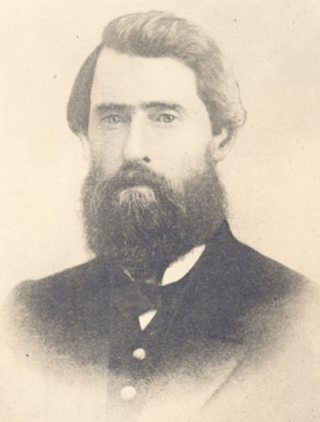
Jason Lee was a Canadian Methodist Episcopalian missionary and pioneer in the Pacific Northwest. He was born on a farm near Stanstead, Quebec.

Willamette Heritage Center is a museum in Salem, Oregon. The five-acre site features several structures listed on the National Register of Historic Places including the Thomas Kay woolen mill, the Jason Lee House, Methodist Parsonage, John D. Boon House, the Pleasant Grove (Condit) Church. The houses and church were relocated to the mill site. The Center also includes a research library and archives of Marion County history. Today, the Willamette Heritage Center offers self-guided tours, event rental spaces, educational classes, and also hosts local events for the community.

The Champoeg Meetings were the first attempts at formal governance by European-American and French Canadian pioneers in the Oregon Country on the Pacific Northwest coast of North America. Between 1841 and 1843, a series of public councils was held at Champoeg, a settlement on the French Prairie of the Willamette River valley in present-day Marion County, Oregon, and at surrounding settlements. The meetings were organized by newly arrived settlers as well as Protestant missionaries from the Methodist Mission and Catholic Jesuit priests from Canada.
Alanson Beers was an American pioneer and politician in the early days of the settlement of the Oregon Country. A blacksmith by trade, he was a reinforcement for the Methodist Mission in what would become the state of Oregon. The Connecticut native helped found the Oregon Institute and participated in the Champoeg Meetings where he was elected to serve on the Executive Committee in 1843.
The Willamette Cattle Company was formed in 1837 by pioneers in the Willamette Valley of present-day Oregon, United States. The company was formed with the express purpose of purchasing cattle in Mexican California. Nearly 750 head of cattle and 40 horses were purchased in total. Ewing Young led the overland party as they drove these animals north back to the Willamette Valley.

The Oregon Institute was an American school located in the Willamette Valley of the Oregon Country during the 19th century. Begun in 1842, it was the first school built for European Americans west of Missouri. Founded by members of the Methodist Mission, it was located in what is now Salem, Oregon. The school began as a pre-college institution, but by 1853 was developed as Willamette University. The school's three-story building was a prominent feature in the early days of Oregon; it served as a meeting place for the Oregon Territorial Legislature when it first moved to Salem.

Ira Leonard Babcock was an American pioneer and doctor in the Oregon Country. A native of New York, he was selected as the first Supreme Judge with probate powers in February 1841 in what would become the state of Oregon.
The Methodist Mission was the Methodist Episcopal Church's 19th-century conversion efforts in the Pacific Northwest. Local Indigenous cultures were introduced to western culture and Christianity. Superintendent Jason Lee was the principal leader for almost a decade. It was a political and religious effort. Two years after the mission began, the church's Board of Foreign Missions described its intent to reclaim "these wandering savages, who are in a very degraded state, to the blessings of Christianity and civilized life." Alongside the missions founded in the region were several secular operations opened. These were maintained to allow for material independence from the Hudson's Bay Company (HBC), then the preeminent economic entity in the region among European descendants.
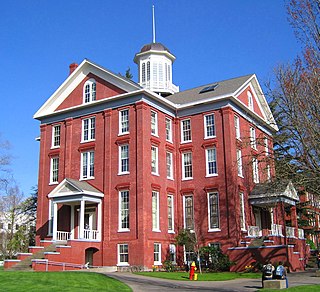
Waller Hall is a building on the campus of Willamette University in Salem, Oregon, in the United States. Opened in 1867 as University Hall, it is the oldest higher-education building west of the Mississippi River still in use, currently housing the university's administrative offices.
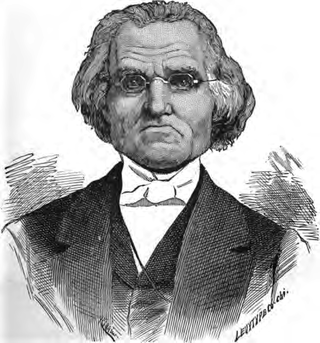
David Leslie was an American missionary and pioneer in what became the state of Oregon. A native of New Hampshire, he joined Jason Lee as a missionary at the Methodist Mission in the Oregon Country in 1836. In that region he participated in the early movement to start a government and his home was used for some of these meetings. With the closing of the mission he became a founder of the city of Salem, Oregon, and board member of the Oregon Institute, which later became Willamette University.
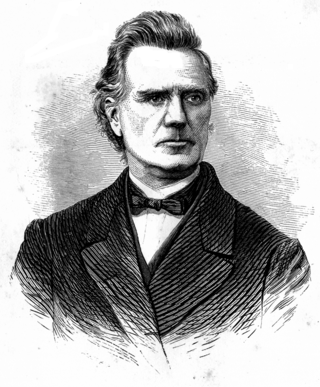
Reverend Gustavus Hines was an American missionary in Oregon Country. Working for the Methodist Mission in what became the state of Oregon, the New York native became involved in early attempts to form a government at the Champoeg Meetings in 1841. Later he served on the board of trustees for the Oregon Institute, which became Willamette University, and wrote several books on Oregon.
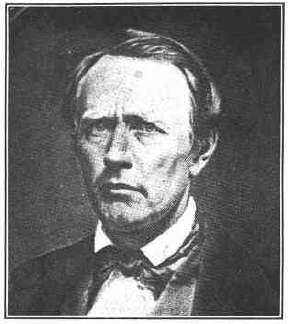
William Holden Willson was a pioneer of the U.S. state of Oregon and the founder of its capital city, Salem. A native of New Hampshire, he immigrated to the Oregon Country in 1837 to work at the Methodist Mission, and there would participate in the Champoeg Meetings. Willson served as the first treasurer of the Provisional Government of Oregon.

Reverend Josiah Lamberson Parrish was an American missionary in the Pacific Northwest and trustee of the Oregon Institute at its founding. A native of New York, he also participated in the Champoeg Meetings that led to the formation of the Provisional Government of Oregon in 1843. Parrish was married three times and was the first breeder of pure-bred sheep in Oregon.

Alvin F. Waller (1808–1872) was an American missionary in Oregon Country and an early leader at Willamette University in Salem, Oregon. He was a native of Pennsylvania and helped found the first Protestant church west of the Rocky Mountains in 1843 in Oregon City.
Col. Isaac R. Moores was an American soldier and politician in Illinois and Oregon. A native of Kentucky, he would serve in the Seminole War and the Black Hawk War before immigrating to the Oregon Territory. In Oregon, Moores served in the Territorial Legislature and at the Oregon Constitutional Convention. His son, Isaac R. Moores, Jr. would become Speaker of the Oregon House of Representatives.
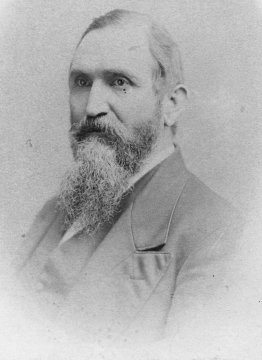
Isaac Ross Moores Jr. was an American businessman and politician in the state of Oregon. The son of Isaac R. Moores, he was born in Illinois and moved to the Oregon Territory in 1852. In Oregon, he would serve in the Oregon House of Representatives, including as Speaker of that body.

John Henry Moores was an American businessman and politician in the state of Oregon. The son of Isaac R. Moores, he was born in Alabama and moved to the Oregon Territory in 1852. In Oregon, he would serve in the Oregon State Senate and as the mayor of Salem.

Charles Bruce Moores was an American businessman and politician in the state of Oregon. A native of Missouri, he came from a family of politicians including his father John H. Moores, his grandfather Isaac R. Moores, and uncle Isaac R. Moores, Jr. who all served in the Oregon Legislature. A Republican, he served as the Speaker of the Oregon House of Representatives during his sole term in the House in 1895.

Portland University was a private, Methodist post-secondary school in Portland, Oregon, United States. Founded in 1891 in a split from Willamette University, the school closed in 1900. The campus was located in what is now the University Park neighborhood and later became home of the University of Portland. The original campus building, West Hall, still stands and is listed on the National Register of Historic Places.

Chloe Aurelia Clark Willson was an early pioneer of what became the U.S. state of Oregon, and one of the first teachers of the Methodist mission in the Willamette Valley. In 1850, she owned half of the land in Oregon's state capital Salem.

















